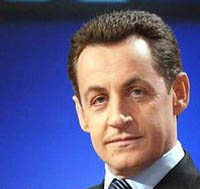Nicolas Sarkozy faces treacherous task to unite fractious conservatives
As Nicolas Sarkozy's longtime quest to become French president heads into its final stretch, the combative interior minister faces the treacherous task of uniting fractious conservatives in a country desperate for change and anxious about competition from rising powers like China.

Sarkozy was consecrated Sunday as the ruling party's presidential nominee, pitching him into a close battle against fellow front-runner Segolene Royal, a charismatic Socialist who would be France's first woman president. She too faces a test in uniting her camp for the two-round election in April and May.
Sarkozy's nomination was no surprise: He was the only person on the ballot for the UMP party's vote. But the formal anointment further sidelines President Jacques Chirac, the party's founder and one-time Sarkozy mentor.
The French are eager for new direction, and their next president will herald a new era after 12 years under Chirac, unpopular and unlikely to seek a third term. France is discouraged, worried about the rise of economic challenges from China and uncertain about how to reach out to unemployment-stricken blacks, Arabs and Muslims.
"I want to be the president of a reunited France," Sarkozy said in his acceptance speech before an estimated 70,000 people at the nomination convention. "Globalization requires us to reinvent everything - to think of ourselves as compared to others."
His speech struck a conciliatory tone unusual for a man known for straight talk and, critics say, obstinacy.
"I'll need - and France will need - everybody here," Sarkozy said, standing among enormous screens and crowds of banner-waving fans as the EUR 3.5 million (US$4.5 million), U.S.-style political convention began.
Sarkozy, unlike Royal, has firm policy positions on nearly every subject. He has earned both kudos and vitriol for vowing to cut cherished workplace protections, championing tough police tactics in hardscrabble housing projects and dispatching illegal immigrants back to Africa and elsewhere.
"We have no purchasing power because we don't work enough," Sarkozy said on state-run TF1 television later Sunday. "The French economy lacks fuel."
In his earlier speech, he touched on education policy - often seen as a Royal strength - with a call for a monthly stipend for students to get jobs training. He called the U.S.-led Iraq war "a mistake," though he has also been the most vocally pro-American of France's modern politicians.
Sarkozy, 51, the son of a Hungarian immigrant, muscled out potential rivals for the party nomination or won them over in recent months.
More than 98 percent of registered party members who cast ballots, primarily via Internet, voted for Sarkozy. The only real question was turnout, which came in at 70 percent of the party's 330,000 members - impressive for a ballot with only one name.
Chirac remains a wild card for Sarkozy. The 74-year-old president has not said whether he will run again, though few expect him to. He was notably absent from Sunday's congress for his Union for a Popular Movement party.
The nomination caps a revival for Sarkozy, who was cast into the political wilderness in 1995 after he supported Prime Minister Edouard Balladur for the presidency - which Chirac won. Sarkozy's comeback began after he was named interior minister in 2002, gaining popularity for cracking down on crime.
Polls show Sarkozy and Royal almost exactly even, though many voters remain undecided.
Royal, 53, a former environment and family minister, has capitalized on an "Anyone But Sarkozy" movement on the left, but she is a divisive figure even in her own camp.
She contradicted the Socialist leader's proposal last week to raise taxes, and has angered many with unorthodox proposals such as military training for wayward youth, the AP reports.
She sidestepped the Socialist Party structure and rose to prominence quickly last year through a grassroots, Internet-based campaign - raising questions about how much she would adhere to party dogma on issues like the 35-hour workweek law cherished by many Socialists.
Subscribe to Pravda.Ru Telegram channel, Facebook, RSS!


